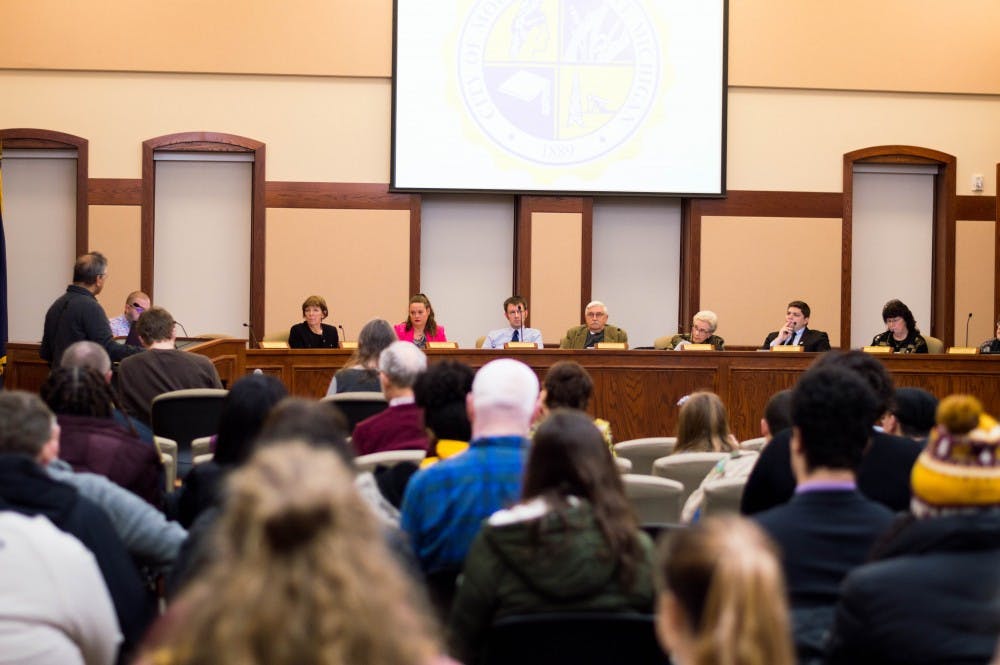City commission approves establishment of Citizens' Advisory Board

Mount Pleasant will move forward with the establishment of a Citizens’ Advisory Board (CAB) after gaining approval from city commission at the Nov. 26 meeting.
A few commissioners described the establishment of the CAB as a "good first step" toward being a more inclusive and diverse community.
City Manager Nancy Ridley said there are new concerns regarding the public perception of the proposal to establish an advisory board, which was first proposed to the commission at its Nov. 12 meeting.
Ridley said she did not want citizens of Mount Pleasant to see the board as an “oversight” or “investigative” board and said the goal of the board would be to simply improve the dialogue between minorities and law enforcement.
The CAB would be composed of three members -- one appointed by city commission, one appointed by the Student Government Association at CMU and the third appointed by the Mount Pleasant Area Diversity Group.
All commissioners were in favor of establishing the board, however, proposals were made to postpone the establishment until after further discussion takes place. Commissioners Tony Kulick, Kathleen Ling and Lori Gillis said there had not been enough time to critically consider the proposal as written.
“At a city board retreat, the discussion leader said there should not be any rabbits pulled out of the hat,” Gillis said. “Everyone should have time to consume what (city commission) is voting on and think it through. Nothing should be done in a split second.”
Three amendments were proposed: to postpone the motion until after it was referred to the city’s new attorney firm in January 2019, to postpone the motion for three months until further discussion and consideration could take place and to postpone the motion until after a work session was held. All three amendments failed to pass.
Gillis made it clear the proposed amendments to postpone the establishment of the board were not made to reject the proposal but instead to “dot the I's and cross the t's” and make sure the establishment of the board would be sustained longer than its one-year review.
Commissioner Will Joseph and Vice Mayor Nicholas Madaj both opposed the amendments and agreed further discussion would not change the decision on the proposal.
“I think we are just kicking the can down the road,” Joseph said. “The resolution in front of us already has a review process, and after one year, (city commission) will have the opportunity to see what it's accomplished and make changes for the better."
Gillis was also concerned that not all local law enforcement agencies were addressed in the proposal -- Mount Pleasant Police Department being the only one.
“I do not want to isolate and target our city’s employees as a problem,” Gillis said.
She suggested including all five of Mount Pleasant's law enforcement agencies: MPPD, Central Michigan University Police Department, Saginaw Chippewa Tribal Police Department, Michigan State Police and Isabella County Sheriff's Department.
Gillis said in preparation for the Nov. 26 meeting she canvassed the city going door to door and did not get any complaints about city police from Mount Pleasant residents.
Those in the audience were in disbelief, shaking their heads and uttering things under their breath.
“(Attendants) came here tonight with a great deal of hope and trust ... in a commission that has championed inclusivity, citizen involvement and the work local government can do,” Mount Pleasant Area Diversity Group member Andrew Blom said.
The proposal passed 6-1, with Kulick opposed. He said he would not vote for the establishment of the CAB until after further discussion was held.
From here, Mount Pleasant will work closely with its attorney firm and the Mount Pleasant Area Diversity Group to make revisions to the proposal. Ling said board member applications must be created before they can be made available to potential applicants.






